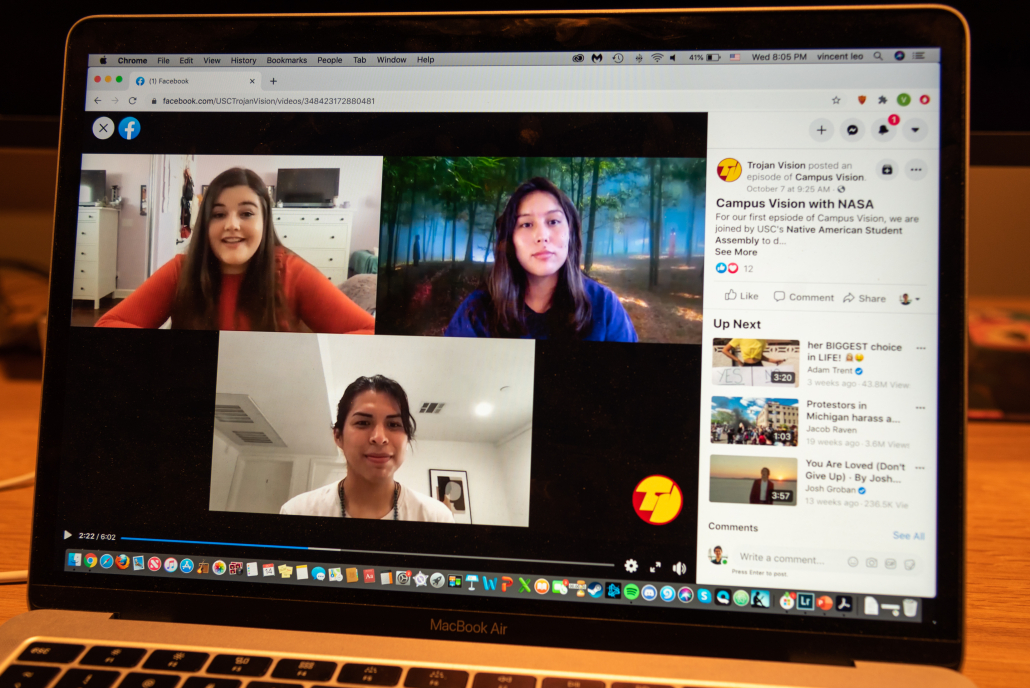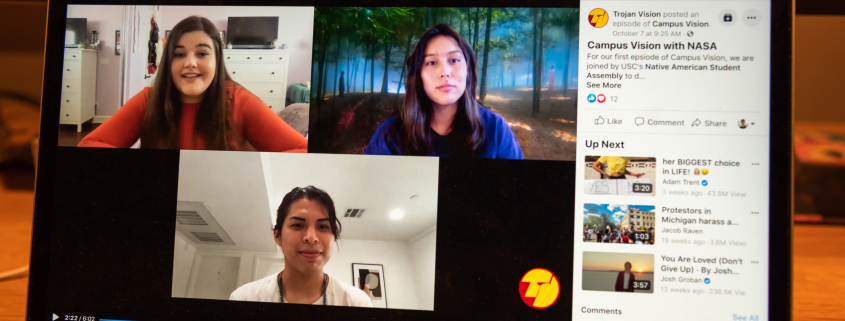Trojan Vision takes on the virtual semester

Normally at 9 a.m. on Wednesday, Sophia Mazzella can be found running around the set of “The Morning Brew,” clipboard in hand, checking in with the crew and ensuring that the show is ready for its 10 a.m. premiere.
But this year, rather than meeting with her team in the studio each week, she has adapted to Zoom pre-production meetings to virtually pull off her new Trojan Vision show, “Campus Vision.” Mazzella, who is now a junior studying cinema media studies, adapted quickly to the online setting in order to book interesting guests and produce a show that audiences on campus and around Los Angeles would want to watch.
Trojan Vision, a student-run School of Cinematic Arts television station, has shifted its television production to a virtual setting because of coronavirus restrictions put in place for the fall semester.
Before USC shifted to an online environment, Trojan Vision students enrolled in CTPR 409 managed, produced and crewed the shows from studios on the Robert Zemeckis Center for Digital Arts. Their shows, now aired on Facebook, normally run on a cable channel that would broadcast to over 700,000 people on campus and in the L.A. area.
Trojan Vision hopes to keep viewership consistent with pre-pandemic numbers through efforts with marketing, alumni and industry contacts, campus outreach and external outreach to other stations and schools.
Mazzella has volunteered with Trojan Vision since her freshman year. Now a general manager for Trojan Vision, Mazzella started “Campus Vision” this semester to highlight different campus organizations in five minute episodes. Creating the web series has helped Mazzella stay connected with the campus community and Trojan Vision while classes remain online.
“I feel like we’re trying to keep that community together, and I think that now we’ve come up with a lot of ways to do that,” Mazzella said. “I’m excited about new people coming in and trying out Trojan Vision hopefully next semester, because I think that when this first happened we were like, ‘How do we keep this going?’ but we kind of figured that out now and I think that our community is like coming back together in a really exciting way.”
Kathleen Dowdey is a CTPR 409 instructor as well as the faculty coordinator for Trojan Vision. Over the summer, Dowdey and other course instructors searched for the appropriate software for students to produce shows from home.
The instructors decided on StreamYard, a live streaming studio that works with social media platforms like Facebook. StreamYard has been an efficient tool used to create virtual segments and helped Trojan Vision reach its audience, Dowdey said.
“[After going through lockdown in the spring, the faculty decided] that if we were really going to be in lockdown again through the fall that we had to keep producing the shows because that’s what we are, a practicum in television production,” Dowdey said. “This was a way that we could produce shows virtually and then stream them on Facebook Live which is what we are going to be doing this fall and it was a huge, huge adjustment.”
Traditionally, Trojan Vision has eight to 10 shows that run each semester, including talk show “The Morning Brew,” sports show “Water Cooler” and “Delish,” a cooking show. Normally, each section of CTPR 409 is assigned a show to work on for the semester, but this semester, students produce their own segments as well as crew on other students’ projects.
The crew is made up of the 409 class and remains on StreamYard, the platform they record on, as well as on Zoom, where the crew communicates so the cast does not hear them. Meanwhile, the host and guest are only on StreamYard.
Paulina Suarez, a fourth-year architecture student in Dowdey’s course, said that although remote learning was challenging at first, faculty were able to weave students into the new system so that they could continue producing from home.
Normally, students in the course assist showrunners and producers, but Suarez said the isolated virtual semester pushed students to spearhead their own segments.
“And then, in our segment, we write it, come up with ideas and themes,” Suarez said. “We find our host, actors and actresses and then we help each other with the different positions that we need help with, like the cast. So basically you’re like your own director, producer and scriptwriter which is pretty cool.”
The cast usually consists of people who have previously hosted Trojan Vision or School of Cinematic Arts students. In order to choose who she wants to cast, Paulina finds audition tapes on the School of Cinematic Arts community portal.
Diya Mehta, one of four general managers at Trojan Vision, runs marketing and social media for Trojan Vision shows to make sure the USC community knows about its programming and opportunities to get involved.
Mehta, a senior majoring in business administration with a minor in cinematic arts, also created a newsletter to keep the community updated on Trojan Vision and its productions. However, ever since operations moved online, Mehta said it has been challenging to keep students engaged.
“Across the board all production classes have taken a hit, just because a big part of production is the hands-on work like working with the camera and the lighting,” Mehta said. “So I think, despite that, Trojan Vision is really doing well, despite … having a lot of students not be able to be on set. We’re really pushing through that and we’re creating content despite that.”
Disclaimer: The story was updated to reflect that Sophia Mazzella is a staff writer in the Daily Trojan arts & entertainment section.

